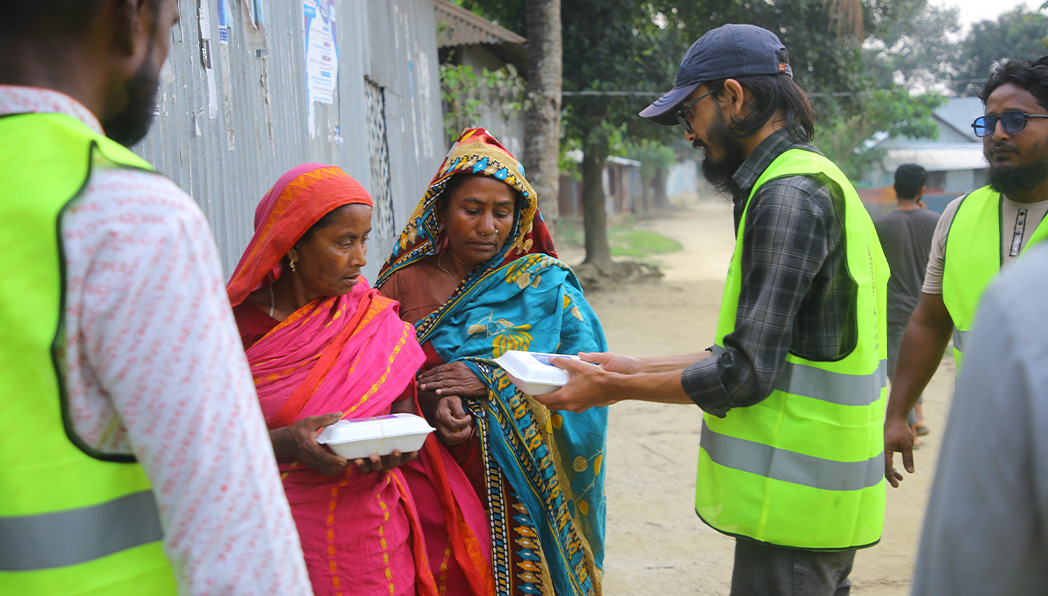Donate Fidyah

Donate Fidyah for missed fasts during Ramadan
Fidyah (Fidya) – Compensate for Missed Fasts & Feed the Poor
"And as for those who can fast with difficulty, they have to feed a poor person as compensation." — Qur’an (2:184)
Unable to Fast This Ramadan? Pay Your Fidyah Today
If you are unable to fast due to illness, old age, or a long-term health condition, Islam allows you to compensate by feeding a person in need.
Fidyah is £3 per missed fast.
£90 covers the entire month of Ramadan.
Your donation provides essential meals to the poor.
Fulfil your duty and provide food to those in need.
What is Fidyah?
Fidyah (Fidya) is a compulsory payment for those who cannot fast due to a valid Islamic reason and cannot make up for it later. Instead of fasting, you must feed a poor person for each missed fast.
£3 provides one meal to a person in need.
£90 covers the entire Ramadan for one person.
Why Your Fidyah Matters
Obey Islamic teachings
Compensate for missed fasts as required.
Feed the fasting
Provide essential meals to struggling families.
Gain spiritual rewards
Donating in Ramadan multiplies blessings.
Donation Policy
Your Fidyah directly helps those in need.
This small act of kindness provides relief to those who need it most.
Fidyah Calculator ↓
Fidyah consists of paying £3 for a person per day.
Frequently asked questions
Fidyah is a charitable compensation required when a person is unable to fast during Ramadan due to a valid reason, such as chronic illness, old age, or pregnancy, and cannot make up the fast later. It serves as an alternative way to fulfil the obligation of fasting by feeding a person in need for each missed fast.
At Crisis Aid, we ensure that your Fidyah donations are used to provide meals to the most vulnerable, helping them receive nutritious food while fulfilling your religious duty.
The Fidyah amount is based on the cost of feeding a needy person for one day. The current rate varies, but generally, it is set at £3 per missed fast, meaning a full month’s Fidyah would be £90 (for 30 fasts).
This amount is calculated based on the cost of staple food items in the region where the aid is delivered. Crisis Aid ensures that your donation provides essential meals to those in desperate need.
Fidyah can be paid in advance if you are certain that you will be unable to fast due to a long-term condition. Many people choose to pay their Fidyah at the beginning or during Ramadan to ensure their obligation is fulfilled on time.
However, if the reason preventing fasting is temporary, such as short-term illness or pregnancy, then Fidyah should only be paid once it is confirmed that the missed fasts cannot be made up later.
Crisis Aid accepts Fidyah payments throughout the year and distributes the aid promptly to those in need.
Fidyah must be given to people who are genuinely in need and cannot afford sufficient food. It is not permissible to give it to those who are financially stable.
Crisis Aid ensures that Fidyah donations reach those who are truly struggling, including refugees, widows, orphans, and families living in extreme poverty. Your donation provides them with meals that meet their daily nutritional needs.
If you recover from your condition and are able to fast at a later date, you should make up the missed fasts instead of paying Fidyah. Fidyah is only applicable when fasting is permanently impossible.
However, if you have already paid Fidyah while assuming you could not fast but later regain your health, your Fidyah still counts as charity (Sadaqah), and you should make up the fasts as required.
Crisis Aid provides a transparent and effective way to ensure your donation is used correctly, whether as Fidyah or general charity.
Yes, you can pay Fidyah on behalf of someone who is unable to fast due to a permanent health condition, old age, or other valid reasons. This includes elderly parents, sick relatives, or even deceased family members who had outstanding Fidyah obligations.
By donating through Crisis Aid, you ensure that the Fidyah given on behalf of others reaches the most deserving, fulfilling the obligation on their behalf while helping to feed the poor.
Enter your donation ↓

How Fidyah Helps
Your Fidyah donations provide essential food to those struggling with hunger, ensuring they receive proper meals. This support not only helps alleviate immediate hunger but also contributes to the well-being and stability of vulnerable individuals and families, allowing them to focus on other essential needs without the burden of food insecurity.
Donate your Fidyah
Fidyah is £3 per day If you are unable to fast out of necessity, Must feed 1 poor person
